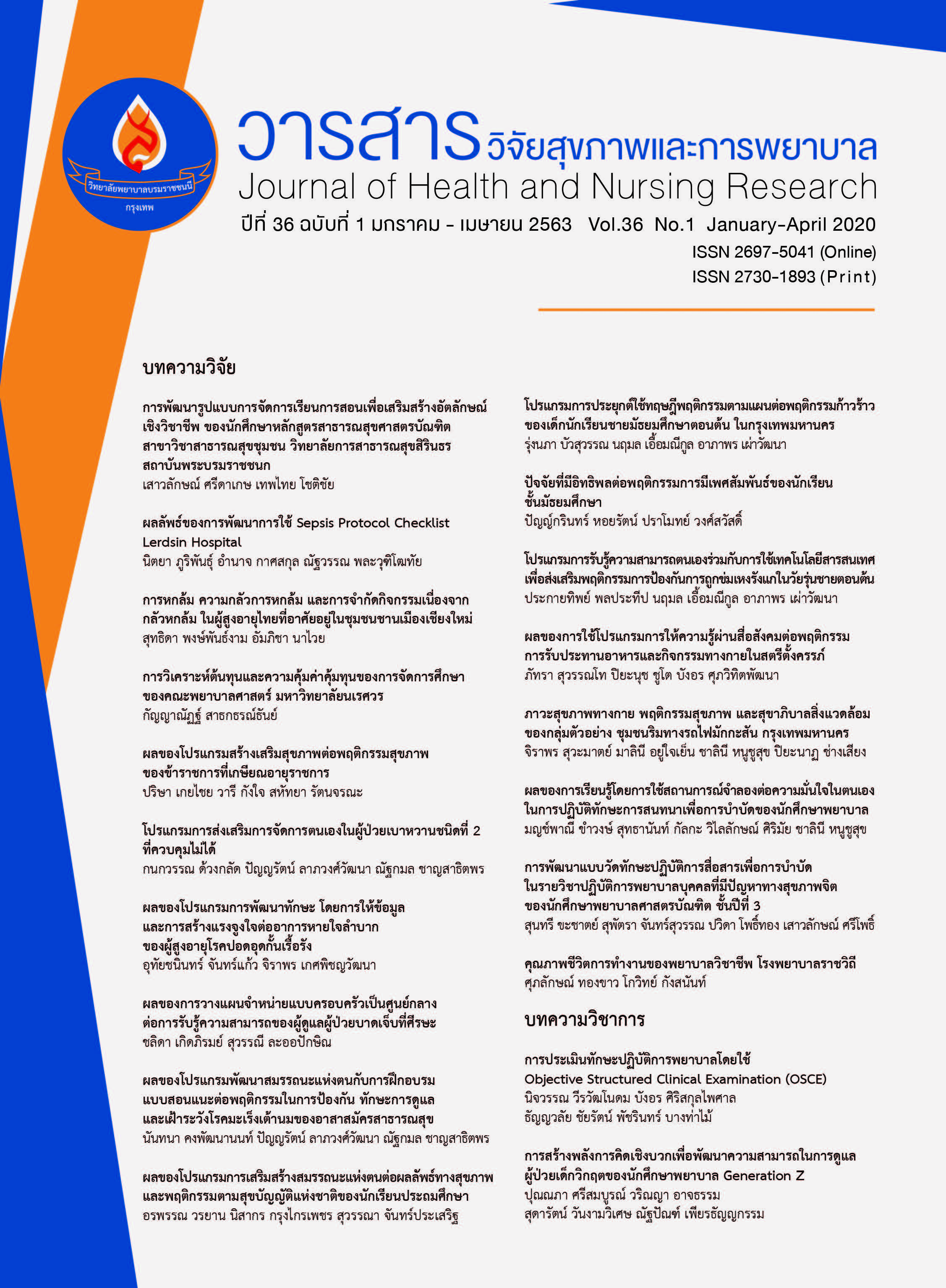การประเมินทักษะปฏิบัติการพยาบาลโดยใช้ Objective Structured Clinical Examination (OSCE)
คำสำคัญ:
การประเมินทักษะปฏิบัติการพยาบาล, การประเมินโดย OSCEบทคัดย่อ
บทความวิชาการนี้ มีวัตถุประสงค์เพื่อแลกเปลี่ยนเรียนรู้การประเมินทักษะปฏิบัติการพยาบาลโดย OSCE เนื่องจากการจัดการศึกษาวิชาชีพพยาบาล มีเป้าหมายสำคัญคือ การพัฒนานักศึกษาให้มีทักษะการคิดอย่างมีวิจารณญาณ สามารถตัดสินใจทางคลินิก และสามารถประยุกต์ความรู้ทางทฤษฎีไปสู่การปฏิบัติได้อย่างมีประสิทธิภาพ นอกจากนี้บัณฑิตต้องมีทักษะตามกรอบมาตรฐานคุณวุฒิระดับอุดมศึกษาแห่งชาติ 6 ด้าน โดยเฉพาะทักษะด้านการปฏิบัติทางวิชาชีพนั้นมุ่งพัฒนานักศึกษาให้มีทักษะปฏิบัติการพยาบาลและมีการตัดสินใจทางคลินิกที่ถูกต้อง การประเมินทักษะปฏิบัติการพยาบาลโดย OSCE เป็นวิธีการประเมินที่มีมาตรฐานครอบคลุมการวัดระดับความรู้ ทักษะการปฏิบัติ และการตัดสินใจตามสถานการณ์ที่กำหนด การประเมินวิธีนี้มีหลักการที่สำคัญคือ การกำหนดทักษะที่ประเมินต้องวิเคราะห์ผลลัพธ์การเรียนรู้ของนักศึกษา สร้างสถานการณ์จำลองที่สอดคล้องกับทักษะที่กำหนด จัดทำ/ทบทวนแบบประเมิน กำหนดสถานที่สอบที่เหมาะสม ทำความเข้าใจทีมผู้สอน เจ้าหน้าที่ และนักศึกษา ดำเนินการสอบโดยแบ่งเป็นสถานีย่อยอย่างน้อย 2 สถานีในแต่ละทักษะ เพื่อให้เพียงพอต่อจำนวนนักศึกษา การประเมินทักษะปฏิบัติการพยาบาลโดย OSCE เป็นวิธีการประเมินที่ดีของการศึกษาภาคปฏิบัติ เพื่อประเมินทักษะปฏิบัติการพยาบาลหรือวัดความรู้รวบยอดของนักศึกษาในการเลื่อนชั้นปีหรือสำเร็จการศึกษา นอกจากนี้ควรจัดให้มีการประเมินทักษะปฏิบัติการพยาบาลโดยใช้ OSCE ก่อนขึ้นฝึกภาคปฏิบัติ เป็นการเตรียมความพร้อมก่อนฝึกภาคปฏิบัติและสร้างความมั่นใจในการปฏิบัติงานของนักศึกษา และเพื่อพัฒนาทักษะที่จำเป็นของนักศึกษาให้มีสมรรถนะตามกรอบมาตรฐานคุณวุฒิระดับอุดมศึกษาแห่งชาติ มีทักษะปฏิบัติการพยาบาล มีการตัดสินใจทางคลินิกที่ถูกต้องเหมาะสมตามมาตรฐานการเรียนรู้ และให้การพยาบาลที่มีคุณภาพต่อไป
Downloads
เอกสารอ้างอิง
2. Inkaew T, Pakanta I. Objective Structured Clinical Examination (OSCE): Application in nursing practicum. Journal of Nursing and Health Sciences 2017;11(3):1-7. (in Thai)
3. Hosseini SA, Fatehi N, Eslamaian J, Zamani M. Reviewing the nursing students’ view toward OSCE test. Iran J Nurs Midwifery Res 2011;16(4):318-20.
4. Praboromarajchanok Institute for Health Workforce Development. A Guideline of clinical skills assessment with objective structured clinical examination (OSCE) of the Bachelor of Nursing Program Nursing College under the Praboromarajchanok Institute. Nonthaburi: Yutharin Printing; 2016. (in Thai)
5. Zayyan M. Objective structured clinical examination: the assessment of choice. Oman Med J 2011;26(4):219-22.
6. ElDarir SA, Abd el Hamid NA. Objective structured clinical evaluation (OSCE) versus traditional clinical students achievement at maternity nursing: a comparative approach. IOSR-JDMS 2013;4(3):63-8.
7. Katowa-Mukwato P, Mwape L, Kabinga-Makukula M, Mweemba P, Maimbolwa MC. Implementation of objective structured clinical examination for assessing nursing students’ clinical competencies: lessons and implications. Creative Education 2013; 4 (10A): 48-53.
8. Ekthamasuth C, Taweesuk P, Choijoho R. The development of objective-structured clinical examination instrument in Maternal and Newborn Nursing and Midwifery Practicum II. Journal of Boromarajanani College of Nursing, Bangkok 2017;33(3):27-37. (in Thai)
9. Lohapaiboonkul N, Palakarn B. The effects of an objective structured clinical examinations (OSCEs) test to evaluate the knowledge and clinical skills in basic medical treatment and perceive of preceptors from community of the clinical skills of nursing students. Nursing Journal of the Ministry of Public Health 2014;23(3):24-34. (in Thai)
ดาวน์โหลด
เผยแพร่แล้ว
รูปแบบการอ้างอิง
ฉบับ
ประเภทบทความ
สัญญาอนุญาต
บทความที่ได้รับการตีพิมพ์ เป็นลิขสิทธิ์ของวารสารวิจัยสุขภาพและการพยาบาล (วิทยาลัยพยาบาลบรมราชชนนี กรุงเทพ) ไม่สามารถนำไปตีพิมพ์ซ้ำในวารสารฉบับอื่น


















